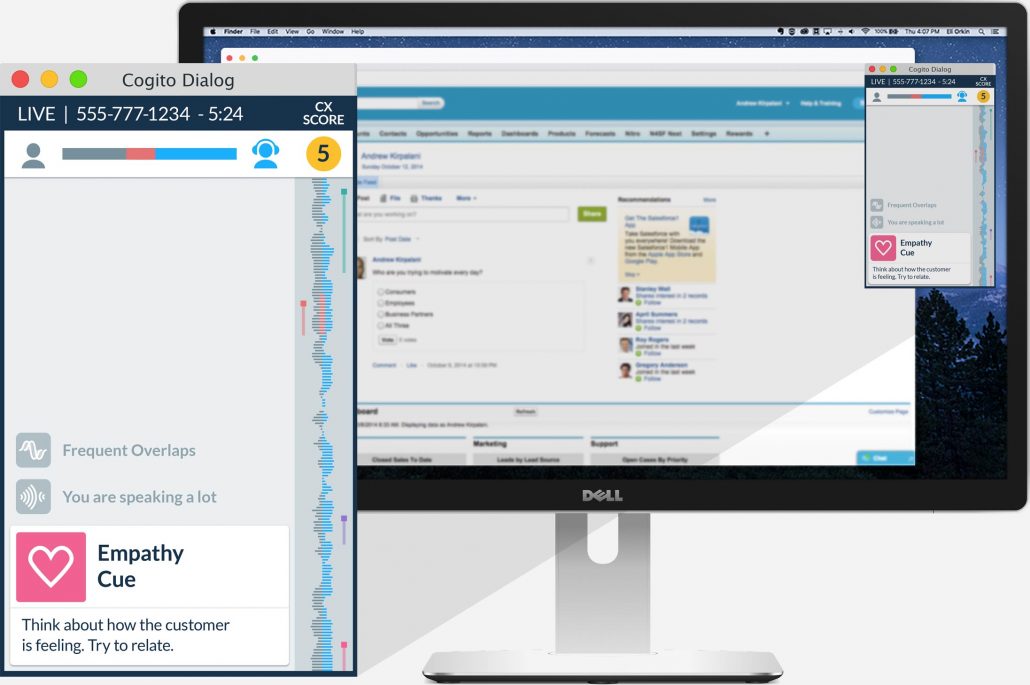Cogito Blog
Beyond the Marketing Hype: How Cogito Delivers Real Value Through AI
This post originally appeared on OpenView’s partnership blog.
Just a few months into 2017, and AI already reigns supreme as the most buzzed about topic in tech. So, with all that hype, you might be wondering just how you too can incorporate AI into your product. But before you do, keep in mind that SaaS companies need to be careful of falling into the “shiny-object” trap. In this dynamic environment, where the temptation to develop software around “sexy” technology is high, it’s more important than ever to make sure your product delivers value that translates into a positive return on your customer’s investment.
Take Cogito, for instance, a company that’s harnessed AI to deliver real-time emotional intelligence to thousands of customer support and sales agents in the insurance, health, and financial industries. While AI has been around for quite a while, it was only recently that companies like Cogito unlocked its value for their customers. “In the past, technology providers would develop an AI platform, but leave it to their customers to figure out a use for the platform,” explains Steve Kraus, VP of Marketing for Cogito. Unfortunately, most customers weren’t sure what to do with an AI platform, so they couldn’t quantify the ROI or justify an investment.
“AI has moved beyond the novelty stage,” says Kraus. “We can now prove that it solves practical, real-world problems.”
Start with Your Customer’s Problem
Solving real-world problems is always a good place to start, and it’s exactly where the Cogito team focused when developing their product. “In practical terms, companies think of problems first and then solutions,” says Kraus. “They don’t say, ‘Hey, AI is cool. We should play around with that.’ They say, ‘We have this problem. What’s the best, most innovative way to solve it?’”
In Cogito’s case, the problem that needed solving was how to help companies build a trusted, emotional connection with their customers via agent interactions. “Before they had Cogito, companies didn’t have tools in place that helped them actually have better conversations with their customers,” says Kraus. “But now, with Cogito, companies can help guide agent speaking behavior in real-time to display empathy and build better rapport and they’re able to do it at scales, across thousands of agents.”

Whether you’re building a product, pitching a customer, or working on positioning, zooming in on the customer’s problems and the outcomes you can deliver is crucial to long-term success. “You need to focus on the outcomes and position your technology as the enabler of those outcomes,” Kraus says. “You need to start not by thinking about what you’ve pioneered, but by keeping in mind the outside perspective of the problems your customers face and the tangible benefits your technology can provide. How will your product help people do better? That’s the best way to position yourself for success.”
Prove Your Product’s Value (Sooner Than Later)
Once you’ve established the value you’re hoping to create, the next step is proving that you can deliver. “In addition to finding explicit problems you can fix, you’ve got to prove that you can actually fix them,” says Kraus. “That’s where customer implementation and success comes in.”
The Cogito team puts a lot of effort into making sure customers get the most out of their AI platform. “We focus deeply on customer success outcomes because we realized that if we don’t, and customers don’t get what they want from the software, they’re not going to use it for very long,” says Kraus. In Cogito’s case, the goal is to enhance what they call “people performance,” which is basically all about helping agents do a better job of connecting with customers by providing the right infrastructure and tools to teach better conversation and call management skills.
In a perfect world, you’re able to prove your value quickly. “Customers have elevated their expectations. They now believe that software should enable continuous improvement,” says Kraus. “You shouldn’t have a long tail between when you measure and when you improve.” For Cogito, their software combines performance measurement and improvement in a single application, something that Kraus believes will eventually become standard for most software.
By eliminating the delay from use to outcome, Cogito is able to provide an immediate proof of value. “We’ve closed the gap between measurement and improvement,” Kraus says, referring to how Cogito is different from traditional methods of call center performance measurement, which typically involve post-call quality monitoring that creates a disconnect between the task and the feedback. “With Cogito, we’re actually giving agents real-time behavioral feedback and guidance that enhances their performance in the moment,” Kraus explains, “We’re measuring and improving and learning. In a complete unbroken loop.”
It’s also important, of course, to use the right metrics to measure value. In Cogito’s case, since they are enhancing customer interactions and improving employee performance, they look at related stats including improvement in customer satisfaction, employee engagement and employee productivity. The measurement data you use will depend on both your product’s features and the desired outcomes, but being able to provide hard numbers is critical to definitively proving your product’s ability to deliver a positive ROI.
Create Multi-dimensional ROI
Finally, while it’s a good start to focus on creating value and positive ROI in one-dimension, your position will be even stronger if you can make a case for a multi-dimensional ROI that benefits not only your direct customer, but also their employees and their customers. “We look at a win-win-win equation,” says Kraus. “Employees like the application because it enhances their performance. Managers like it because it helps their employees’ performance and provides novel insights into how they can do even better. And our customers’ customers like it because they have great conversations with companies who come across as competent and caring.”
This approach also ensures better adoption and engagement at all levels, from the executives who are signing the checks to the people who are using the product. “The executives who work with us on change management within their organizations know that if they’re not enhancing the lives of their employees by giving them the tools they need to make their lives easier and their performance better, then ultimately the solution isn’t going to work on the front lines with customers.”
Thinking through that entire range of ROI – from business to employee to customer – helps Cogito make a strong case for their software because it speaks to everyone involved and brings everything back to their customers’ bottom line. AI might be at the center of Cogito’s innovative technology, but it’s not there for mere marketing effect. “The companies we deploy within are in customer-centric industries, customer relationships are the lifeblood of their business,” says Kraus. “The key to their growth is how they can attract, retain and grow the customer base. At the end of the day nothing is more important than how their customers feel about conversations with the company.”
 ASHLEY MINOGUE
ASHLEY MINOGUE
Market Strategist | Openview Capital
[no_icons icon_pack=”font_awesome” fa_icon=”fa-linkedin” fe_icon=”” fa_size=”fa-1x” custom_size=”24″ type=”normal” rotated_shape=”no” border_radius=”” shape_size=”” icon_color=”#152d43″ position=”” border_color=”” border_width=”” background_color=”” hover_icon_color=”#0092f7″ hover_border_color=”” hover_background_color=”” margin=”” icon_animation=”” icon_animation_delay=”” back_to_top_icon=”” link=”https://www.linkedin.com/in/ashley-minogue-12a956b” anchor_icon=”” target=”_blank”]